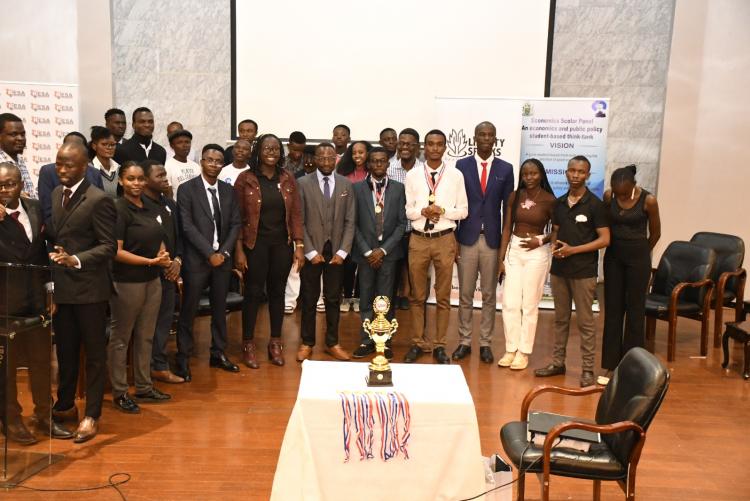The 3rd Edition of the National Economics Debate 2024 was held on 5th November 2024 at the University of Nairobi, hosted by the Department of Economics in the Chandaria Auditorium at UoN Towers. The event brought together economists and students from across Kenya, united by the theme: “Sustainable Education: From Access to Economic Returns.”
The event’s success was largely attributed to the active involvement of key partners, including Bajeti Hub, the Energy Society of Kenya (ESK), Liberty Sparks, Roundtech Solutions, and the American Institute for Research (AIR). These partners contributed expertise, resources, and valuable insights, playing a crucial role in shaping discussions on sustainable education and its economic impact.
In her opening remarks, the Acting President of the Kenya Economics Students Association (KESA) praised the platform for enabling students to engage with policymakers and industry leaders. She emphasized, “As future economists, it is our responsibility to push the boundaries of academic knowledge and translate it into practical solutions that can drive Kenya’s economic growth. We are here to learn, challenge ideas, and develop innovative policies that will shape the future of our country.” She urged students to take an active role in policy discussions and view education as a powerful tool for economic transformation.
Dr. Abraham Rugo, Executive Director of Bajeti Hub, reiterated the hub’s commitment to supporting the forum, particularly in areas related to education and compensation. He emphasized that Bajeti Hub aims to foster collaboration and contribute to policy discussions that bridge the gap between education and economic growth.
Ms. Christine Kiecha, Managing Director of the American Institute for Research (AIR), highlighted that AIR is focused on social and behavioral sciences. Based in the United States, AIR aims to increase the supply of social and behavioral science researchers in Africa. She also emphasized the firm’s partnerships and mentorship programs with the University of Nairobi (UoN), aimed at fostering growth and development in these critical research areas.
Mr. George Odhiambo, Managing Director of National Bank of Kenya (NBK), stressed the importance of personal responsibility in achieving sustainability. He remarked, “Sustainability starts with you and me, by converting knowledge into products that can benefit the community.” He encouraged students to leverage their networks and recognize the influence they have as they progress in their careers. “Your power lies in your ability to turn your studies into actionable policies,” he added. He also advised students to develop secondary skills beyond their primary field of study, such as governance, basic ICT, and accounting, and to engage in volunteer work. “You will gain invaluable experience by taking up diverse opportunities. After completing your studies, remember to repay your debts so future students can benefit from the same support,” Mr. Odhiambo said.
The chief guest Dr. Kingori, Principal Education Officer at the Directorate of Higher Education, delivered an important speech highlighting the need for Kenya's tertiary education system to align with global job market demands. He outlined the government's efforts to improve education quality, infrastructure, and curriculum, while urging greater collaboration to create a more efficient system that prepares graduates for a rapidly changing economy.
The first plenary session, titled Kenya's Tertiary Education in Perspective, provided an in-depth examination of the current state of higher education in Kenya, highlighting both its challenges and opportunities. The second plenary, Building Efficient and Effective Tertiary Education in Kenya, focused on strategies to enhance the quality and efficiency of the system. Additionally, a panel discussion with industry representatives—including experts from the Capital Markets Authority (CMA), KASNEB, the Kenya Universities Staff Union (KUSU) President, and young researchers explored the challenges facing Kenya's tertiary education system and discussed potential solutions for improvement.
The motion for the debate was: “This House Will Gag the Reliance on Educational Technology to Reduce Existing Inequalities.” It sparked intense discussions, with participants especially those in the finals debating the pros and cons of using educational technology to address inequalities within the system. The semi-finals ignited passionate debates on various aspects of Kenya's educational system, while the finals brought together the strongest arguments and insights from earlier rounds, culminating in a powerful and thought-provoking conclusion.
The competition across various categories was intense, and the final results were as follows:
- 1st Place (Best Overall Team): University of Nairobi, Team A
- 2nd Place: University of Nairobi, Team B
- 3rd Place: Jomo Kenyatta University of Agriculture and Technology (JKUAT)
Additionally, the awards for Best Debater were presented as follows:
- Best Male Debater: JKUAT
- Best Female Debater: JKUAT
In recognition of outstanding creativity, Masaai Mara University won the Creative Writing Award, showcasing their innovative approach to addressing economic challenges through creative writing.

